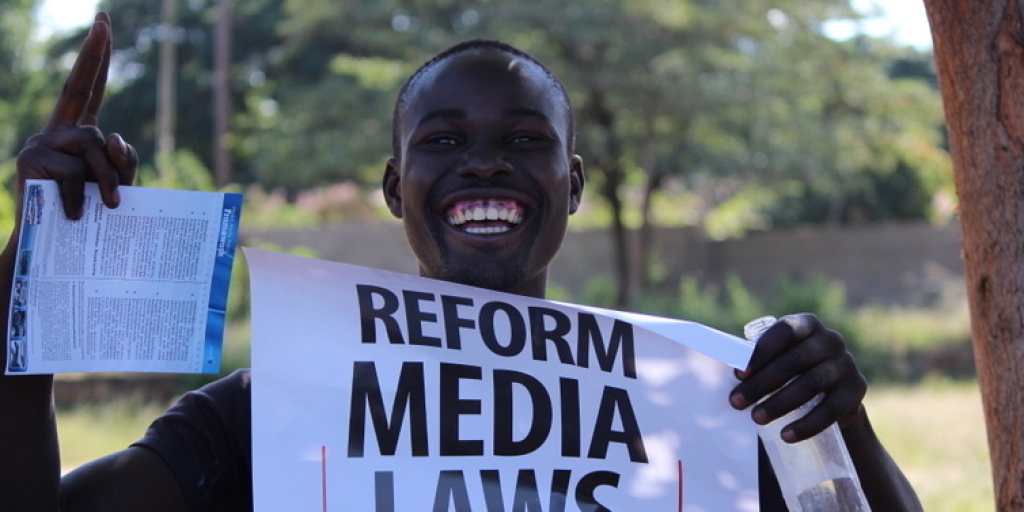UNESCO, AU reaffirm commitments to the safety of journalists worldwide
PICTURE: Maxim Dondyuk/UNESCO
UNESCO and the African Union (AU) will commemorate the 2024 International Day to End Impunity for Crimes against Journalists (IDEI) from 6 to 7 November 2024 at the AU Headquarters in Addis Ababa, Ethiopia.
The event has the theme, ‘Safety of Journalists in Crises and Emergencies’, and marks the 10th anniversary since the first IDEI was observed at the European Court of Human Rights in Strasbourg, France, in 2014.
In 2013, the UN General Assembly Resolution 68/163 established 2 November as the International Day to End Impunity for Crimes against Journalists, following the killing of two Radio France Internationale journalists in Mali.
This year also marks the 20th anniversary of the establishment of the mandate of the Special Rapporteur on Freedom of Expression and Access to Information in Africa by the African Commission on Human and Peoples’ Rights (the ACHPR), during its session in 2004 in Dakar, Senegal.
These acts strengthened co-operation between UNESCO and the AU within the framework of UNESCO’s Operational Strategy for Priority Africa.
The IDEI 2024 Global Commemoration is an opportunity to reaffirm commitments to promoting and guaranteeing freedom of expression worldwide, strengthening international co-operation in ensuring the safety of journalists and media workers in crises and emergencies, and engaging national, regional and international stakeholders in finding solutions to address issues and challenges specific to Africa.
Two key UNESCO initiatives will be launched during IDEI 2024 – a Global Repository of National Safety Mechanisms for Journalists and an Issue Brief on National Safety Mechanisms for Journalists, which includes recommendations for all stakeholders on the implementation of such mechanisms, encouraging a broad view of safety tailored to local safety contexts.
In Africa, a second assessment on the State of Media Freedom and the Safety of Journalists in Africa by UNESCO, is currently underway, and the report is expected to also be launched on the second day of the IDEI 2024 conference.
Here, Tawfik Jelassi, UNESCO Assistant Director-General for Communication and Information presents the Repository.
As co-ordinator for the implementation of the United Nations Plan of Action on the Safety of Journalists and the Issue of Impunity, UNESCO has developed the Global Repository of National Safety Mechanisms for Journalists to protect, prevent and prosecute crimes committed against them.
The Repository is a contribution to the repositioning of the Plan and a response to the Call for Action. It serves as a reference point for journalists, media managers, relevant stakeholders, experts and the general public on the broad spectrum of mechanisms currently in place. It also aims to assist duty-bearers and rights-holders to further engage with these mechanisms on issues related to the safety of journalists.
The National Safety Mechanisms included in this Repository address the safety of journalists in one or more of the three axes of prevention, protection and prosecution. National Action Plans with a component specific to the safety of journalists are also included in the Repository as key multi-stakeholder structures for the implementation of nationally based mechanisms addressing local safety contexts.
‘While there is no unique definition or format of national safety mechanism, they have in common to bring together State authorities (such as the security forces, the government, the judicial system), media representatives as well as other relevant stakeholders such as those monitoring attacks against journalists’
A central aspect of the UN Plan of Action is the establishment of global standards from which regional and national policies can draw upon for inspiration.
Therefore in 2022, UNESCO undertook a year-long, global, multistakeholder consultative process in all regions, focusing on the regional implementation of the Plan and on how to address emerging challenges in order to Reaffirm, Recommit and Reposition the Plan for a second decade.
A key outcome of the consultations was a renewed call from numerous stakeholders to establish and strengthen national mechanisms for the safety of journalists. Another interconnected, yet separate, outcome of the consultations, was a call for the safety of journalists to be an essential component of National Human Rights and Development Plans, particularly within the context of achieving the Sustainable Development Goals.
UNESCO has recorded a number of initiatives by Member States in this regard, for example:
- According to the Observatory of Killed Journalists, there have been eight killings in France since 1993. All have been judicially resolved according to the latest Director-General’s Report on the Safety of Journalists and the Danger of Impunity. France responded to the Director-General’s request for information on the judicial status of the cases of these killed journalists in 2016, and there are two national safety mechanisms being implemented in France to prevent, protect and prosecute crimes committed against journalists. More information on this initiative is summarised here.
- According to the Observatory, there have been over 45 recorded killings in Honduras since 1993. Approximately 20% of these crimes have been judicially resolved, according to the latest Report. Honduras has responded 11 times to the requests for information of these cases since 2011. There are two national safety mechanisms being implemented in Honduras.
- According to the Observatory, there have been four recorded killings in Kenya since 1993. None has been judicially resolved according to the latest Report. Kenya has responded seven times to requests for information of the cases since 2011. There is one national safety mechanism being implemented in Kenya.
- According to the Observatory, over 150 killings have been recorded in Mexico since 1993. Approximately 12% of these crimes have been judicially resolved according to the latest Report. Mexico has responded 11 times to requests for information of the cases of these killed journalists since 2009. There are six national safety mechanisms being implemented in Mexico.
- According to the Observatory, there have been over 90 recorded killings in Pakistan since 1993. Approximately 2% of these crimes have been judicially resolved according to the latest Report. Pakistan has responded five times to the requests for information of the cases of these killed journalists since 2009. There are two national safety mechanisms being implemented in Pakistan.
- According to the Observatory, there have been over 75 recorded killings in Somalia since 1993. Approximately 25% of these crimes have been judicially resolved according to the latest Report. Somalia has responded five times to the requests for information of the cases of these killed journalists since 2009. There is one national safety mechanism being implemented in Somalia.
The information on this Repository has been received from UNESCO’s partners on the Safety of Journalists, Member State responses to the Director-General’s requests, and relevant UNESCO Field Office CI Advisors.




